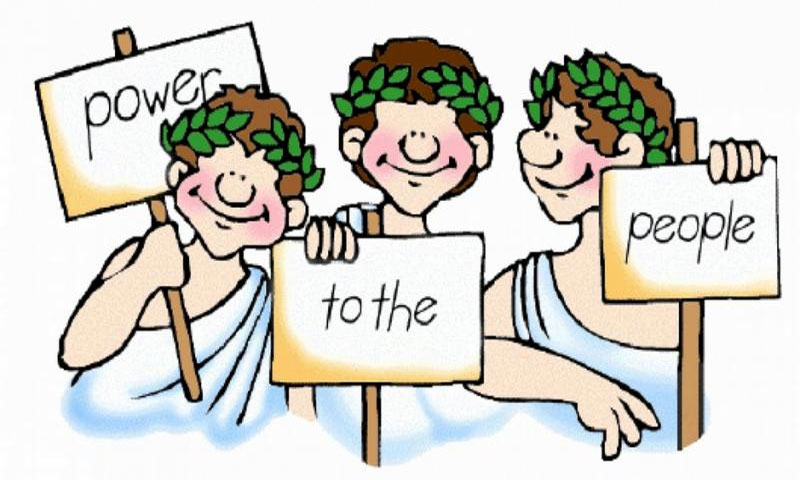Today almost all governance regimes – liberal, socialist, nationalist – claim to be democratic. The only major exception is the Islamic Emirate of Afghanistan. Democracy is usually defined as “rule of the people, by the people for the people”. This is a dangerous half-truth.
Democracy has never been and can never be “rule by the people” – the people (awam) have always been ruled by elites. The people are necessarily those who are governed. The governed and the governors can never be one and the same entity. Similarly, a democratic regime can never be a rule of the people – the people as a whole cannot rule. It can however – in certain circumstances – be rule for the people depending on who the people are. Similarly, democracy can be a rule “of” the people if by “of” we mean “over” the people.
Therefore, the correct definition of democracy is “rule by an elite over a people which may in circumstances by for the people”.
The Historical Evolution of Democracy
The crucial term in our revised definition of democracy is “the people”. Democracy originated in ancient Athens where by “the people” was meant the citizens of the state – the citizens were a small minority of the state’s population which consisted mainly of slaves and aliens who had no role in the governance system. Democracy then disappeared as a model of governance after the collapse of the Roman republic in roughly the first century (CE) and reappeared about twelve/thirteen hundred years later in some Italian cities and later in the market towns of what is now the Netherlands and Germany. In these cities “the people” who ruled over the merchants, bankers, craftsmen and guild participants – again a tiny minority among the state’s population. After the revolutions against absolute monarchy – England (1688), France (1789), America (1776-83) – democratic regimes were established in several countries. Up to the beginning of the twentieth century these also represented minority rule – “of the people” who had the franchise were capitalist property owners – landlords, merchants, industrialists and financers.
In America the establishment of democratic rule required the genocide of the vast majority of the continent’s population – 80 million Red Indians were methodically slaughtered and dispossessed during three centuries. Adult white males were a tiny minority in seventeenth/eighteenth century America – they were the only citizens of the country.
Adult franchise was introduced in all capitalist countries – Europe, America, the USSR and China – and in most colonies during the twentieth century. In the twentieth century “representative government” came to mean representation of the entire population of a state for the first time in history.
Democracy as a Tool of Capitalist Governance
All capitalist states – America, the erstwhile Soviet Union, China, India – are representative democracies. Methods of representation vary but the principle is the same. This principle is embroiled in the presumption that every adult person in the state is a capitalist individual – the assumption that capitalist individuality has been universalized. It no longer remains confined to those who “own” capitalist estates – the financers, the industrialists, the state bureaucrats, the intellectuals. Every individual in expected to regard his body and soul – and its associated labor power – as capital assets subsumed in capitalist property (as Locke argued in the early eighteenth century).
The representative democratic state is a regime for the “people” – provided all the people of a state are capitalist individuals. This means that in the eyes of such a people the sole or main purpose of existence is the maximization of capital accumulation. The dedication of body and soul of the single dominant people to capital accumulation is known as rationality.
A capitalist individual is autonomous – self-determined – but autonomous only to the extent to which he/she is rational. He/she obeys the commands of his baser self – nafs ammara – and admits of no criterea for evaluating the moral worth of it’s command except the principle of universalizability – it is legitimate for him/her to do what his/her nafs amara desires provided this act does not inhibit other capitalist individual from doing what their nafs amara desires. This is how rationality rules autonomy. The capitalist individual is a beast – but a rational beast who respects the capitalist rights of other beasts to fulfil the commands of their nafs amara.
The Democratic Governance Process
Representative democracy provides mechanisms for the articulation/interpellation of the desires of (presumed) universalized capitalist individuality. Presumed capitalist men and women have the right to choose and censor sections of the elite (usually organized in political parties or their factions) who legislate to further particular interests but this legislation is invariably constrained by a constitution which ensures the rule of law – i.e. the rule of law of capital.
That is why the role of the representational bodies – municipal, provincial, federal – remains limited to legislation. The implementation of the legislation in all capitalist democratic regimes is the domain of non-representative bodies – the judiciary, the administration, the police and army, the corporate and financial sectors, the media and entertainment industries. These non-representative executive institutions are peopled by cadres chosen in all democratic states on the basis of their internalization of capitalist knowledge (Jahaliyat-e-Khalsa). So the modus vivendi of all these non-representative capitalist state authorities is rational. They function (through law, prosecution and coercion) to impose (presumed) rational constraints on the (presumed) autonomy of capitalist individuals.
Representative democracy is always the rule of capital. It is the capitalist disciplining (in a Foucaldian sense) of capitalist governance process. It is a means for the imposition of the efficiency demands of rationality upon the desires for autonomy.
But attempts at such subjectification are not always successful. First because subjectification the spirit (ruh) to the nafs amara goes against man’s nature – the ruh is the command of Allah, naturally seeking identification is abdiyat – autonomy is a denial of the fundamental relation of being to Being. Autonomous subjectivity deprives being of the capacity to love (for love is necessarily the rejection of autonomy/self determination). Leading a wholly loveless life is literally impossible for mankind. Hence the production and sustenance of capitalist individuality is inherently problematic and men and women often act irrationally (heteromoniously).
Secondly rationality is Jahliyat-e-Khalisa. It can never identify a unique policy path to operationalize universalizability. There exists no possibility for identifying a correct method for the maximization of the rate of accumulation of capital in general. Strategies of capital accumulation always articulate particular interests and perspectives – and choices among them are always necessarily irrational. Particular interests always and necessarily override the common interest in capitalist politics due to the inevitable “unknowability” of a presumed “common interest” is the basic source of never ending endemic capitalist systemic crises.
The Islamic Revolutionary Response
We are Islamic revolutionaries. We are not idealists. We are not pragmatists. We recognize that the Islamic revolutionary strategy is contextualized within a global capitalist order – a global dar-al-harb. Islamic revolutionaries seek to implode capitalist order by intensifying its inherent contradictions. Imploding the democratic governance process requires the following initiatives.
First we must seek to foster and strengthen non-autonomous, non-rational individuality at the mass level. We must seek to intensify religious and spiritual consciousness.
جاگ سوز عشق جاگ
The promotion of Islamic culture, traditions, rites and rituals is of central concern to Islamic revolutionaries. We must draw close to the traditional maslaki circles and spritiual peers and mashaikhs who throughout our history have been the spiritual and religious murshids of our masses. It is they who have provided and promoted Islamic culture and tradition at the mass level and laid the foundation for the promotion of Islamic individuality.
Second, we must seek to organize the masses under the leadership of the mashaikh, the peers, the ulema and the mosque imams. We must seek to revive and strengthen the systems of hidayat which have traditionally characterized our tribal, biradari and mohalla life. This is a method for de-democratizing society dis-empowering and deconstructing capitalist/civil society) and for creating a state within a state.
Third, we must seek to push back the circuit of capital through the creation of a tamveeli system which integrates the hundreds of thousands of halal businesses (businesses which have no transnational links with the money and capital markets) spread throughout the country. Freeing the masses from capitalist employment can serve as a prime means for reducing the ability of the market role of social governance. The emergence of a dynamic and vibrant undocumented halal economy can also serve as a means for reducing national dependence on imperialist commodity and financing supply chains.
Fourth, the electoral process should be used to deconstruct democratic governance. This requires a) grass roots level unity among the major Islamic parties b) supported by major Islamic non-political organization c) on the basis of an exclusively Islamic electoral agenda d) seeking an enhancement of the governance capability of the mosque/mohalla/bazar based local governance structures that have been created through a social institutionalization strategy.
The electoral organization of social/political consensus building is an exploitable weakness especially of liberal democratic systems. It presumes the universalizability of capitalist (rational, autonomous) individuality. Empowering of non-capitalist (non-autonomous, non-rational) individuality through electoral mechanisms can subvert the democratic process (this suggests a “negation of the negation” in Hegelian terms) as has been effectively shown in Iran.
For the effective use of the electoral mechanism to subvert the democratic process the crucial requirement is the sustenance, social reproduction and political empowerment of non-autonomous, non-rational, non-capitalist individuality.
Dear TNT Reader,
At The News Tribe, our mission is to bring you free, independent, and unbiased news and content that keeps you informed and empowered. We are committed to upholding the highest standards of journalism, as we understand that we are a platform for truth.
Apart from independent global news coverage, we also commit our unique focus on the Muslim world. In an age marked by the troubling rise of Islamophobia and widespread misrepresentation of Muslims in Western media, we strive to provide accurate and fair coverage.
But to continue doing so, we need your support. Even a small donation of 1$ can make a big difference. Your contribution will help us maintain the quality of our news and counteract the negative narratives that are so prevalent.
Please consider donating today to ensure we can keep delivering the news that matters. Together, we can make a positive impact on the world, and work towards a more inclusive, informed global society.
Donate Monthly Subscription Annual Subscription





